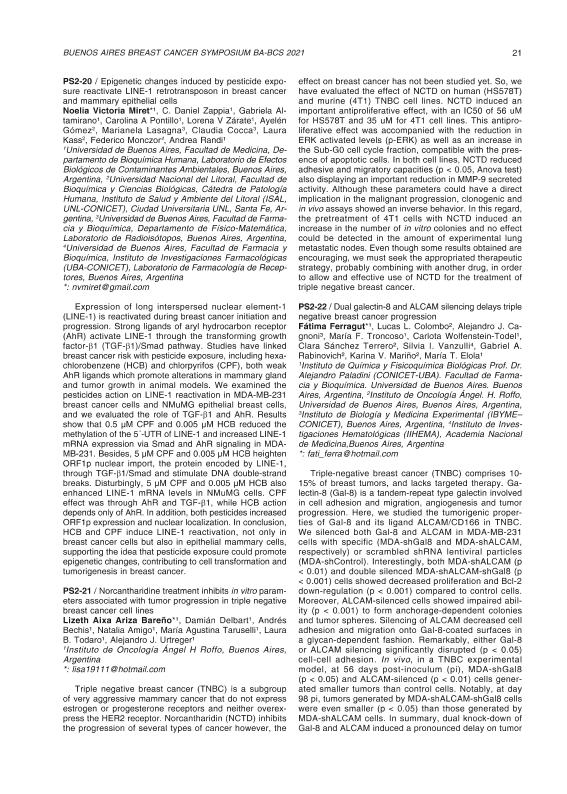Evento
Epigenetic changes induced by pesticide exposure reactivate LINE-1 retrotransposon in breast cancer and mammary epithelial cells
Miret, Noelia Victoria ; Zappia, Carlos Daniel
; Zappia, Carlos Daniel ; Altamirano, Gabriela Anahí
; Altamirano, Gabriela Anahí ; Pontillo, Carolina Andrea
; Pontillo, Carolina Andrea ; Zárate, Lorena Vanesa
; Zárate, Lorena Vanesa ; Gomez, Ayelen Luciana
; Gomez, Ayelen Luciana ; Lasagna, Marianela
; Lasagna, Marianela ; Cocca, Claudia Marcela
; Cocca, Claudia Marcela ; Kass, Laura
; Kass, Laura ; Monczor, Federico
; Monczor, Federico ; Randi, Andrea Silvana
; Randi, Andrea Silvana
 ; Zappia, Carlos Daniel
; Zappia, Carlos Daniel ; Altamirano, Gabriela Anahí
; Altamirano, Gabriela Anahí ; Pontillo, Carolina Andrea
; Pontillo, Carolina Andrea ; Zárate, Lorena Vanesa
; Zárate, Lorena Vanesa ; Gomez, Ayelen Luciana
; Gomez, Ayelen Luciana ; Lasagna, Marianela
; Lasagna, Marianela ; Cocca, Claudia Marcela
; Cocca, Claudia Marcela ; Kass, Laura
; Kass, Laura ; Monczor, Federico
; Monczor, Federico ; Randi, Andrea Silvana
; Randi, Andrea Silvana
Tipo del evento:
Simposio
Nombre del evento:
Buenos Aires Breast Cancer Symposium
Fecha del evento:
17/05/2021
Institución Organizadora:
Asocacion Argentina de Oncología Clinica;
Sociedad Argentina de Investigación Clinica;
Instituto Nacional del Cancer;
Título de la revista:
Medicina (Buenos Aires)
Editorial:
Fundación Revista Medicina
Idioma:
Inglés
Clasificación temática:
Resumen
Expression of long interspersed nuclear element-1 (LINE-1) is reactivated during breast cancer initiation and progression. Strong ligands of aryl hydrocarbon receptor (AhR) activate LINE-1 through the transforming growth factor-β1 (TGF-β1)/Smad pathway. Studies have linked breast cancer risk with pesticide exposure, including hexachlorobenzene (HCB) and chlorpyrifos (CPF), both weak AhR ligands which promote alterations in mammary gland and tumor growth in animal models. We examined the pesticides action on LINE-1 reactivation in MDA-MB-231 breast cancer cells and NMuMG epithelial breast cells, and we evaluated the role of TGF-β1 and AhR. Results show that 0.5 μM CPF and 0.005 μM HCB reduced the methylation of the 5´-UTR of LINE-1 and increased LINE-1 mRNA expression via Smad and AhR signaling in MDA-MB-231. Besides, 5 μM CPF and 0.005 μM HCB heighten ORF1p nuclear import, the protein encoded by LINE-1, through TGF-β1/Smad and stimulate DNA double-strand breaks. Disturbingly, 5 μM CPF and 0.005 μM HCB also enhanced LINE-1 mRNA levels in NMuMG cells. CPF effect was through AhR and TGF-β1, while HCB action depends only of AhR. In addition, both pesticides increased ORF1p expression and nuclear localization. In conclusion, HCB and CPF induce LINE-1 reactivation, not only in breast cancer cells but also in epithelial mammary cells, supporting the idea that pesticide exposure could promote epigenetic changes, contributing to cell transformation and tumorigenesis in breast cancer.
Archivos asociados
Licencia
Identificadores
Colecciones
Eventos(IQUIFIB)
Eventos de INST.DE QUIMICA Y FISICO-QUIMICA BIOLOGICAS "PROF. ALEJANDRO C. PALADINI"
Eventos de INST.DE QUIMICA Y FISICO-QUIMICA BIOLOGICAS "PROF. ALEJANDRO C. PALADINI"
Eventos(ISAL)
Eventos de INSTITUTO DE SALUD Y AMBIENTE DEL LITORAL
Eventos de INSTITUTO DE SALUD Y AMBIENTE DEL LITORAL
Eventos(OCA HOUSSAY)
Eventos de OFICINA DE COORDINACION ADMINISTRATIVA HOUSSAY
Eventos de OFICINA DE COORDINACION ADMINISTRATIVA HOUSSAY
Citación
Epigenetic changes induced by pesticide exposure reactivate LINE-1 retrotransposon in breast cancer and mammary epithelial cells; Buenos Aires Breast Cancer Symposium; Buenos Aires; Argentina; 2021; 21-21
Compartir



